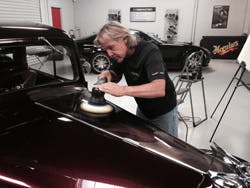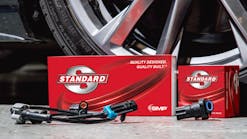Detailing shines as profitable add-on for appearance-oriented operators
Providing automotive detailing can be a lucrative service if the proper education, equipment, materials and business expertise is applied to the venture.
“The industry has gotten much more sophisticated in the last eight to 10 years; there are so many new technologies, especially with waterless products and new paint technology,” says Mel Craig, president of The Detailing Pros, an international training center, supplier and retailer based in Huntington Beach, Calif. It has 47 licensees throughout the U.S. and satellite locations in England and Australia.
“It used to be a kids’ job,” he observes. “For years we were using buckets, brushes and garden hoses.” As standards and customer acceptance have progressed, however, the field has grown to encompass some 8,000 detailers within the U.S. alone
Obtaining the necessary business skills and adopting a professional attitude is a key factor for success, according to Craig, who is seeking to implement regulatory and certification requirements in an industry that remains largely unorganized with far too many “seat of the pants” practitioners.
“We’re trying to eliminate people who don’t belong in this industry,” says Craig, who describes the average detailer as being “a white male, age 34, who is uneducated and broke; 95 percent of the detailing industry barely scratches out a living,” and they frequently lack insurance coverage and other necessary attributes – leading to unacceptable results and tarnished reputations.
“A guy with a $300,000 Ferrari will toss the keys to some guy without even thinking about it. It’s very common to see a lot of mistakes happen,” Craig continues, stressing the need for suitable training when venturing into the occupation. “I can teach anyone how to clean a car, but that doesn’t mean you’ll be successful in this business. We want to teach these guys (and women) how to run a successful business.”
Last year saw a 30 percent increase in women, particularly single moms seeking a flexible work schedule, attending The Detailing Pros training program, he reports. “Women are way more apt to pick up on the business aspects, they pay closer attention to detail, and they end up acing the test.”
With Meguiar’s as a sponsor, the state-of-the-art training center delves into detailed product information, professional detailing skills, customer service instruction and selling techniques. It also provides education on how to set up your own retail outlet, including selecting a location, square footage requirements, appearance features, merchandising, inventory control, marketing and formulating a business plan. “There is a lot to know about opening up a retail store,” says Craig. “As a licensee, you can gain the support of a larger company while maintaining the independence of owning your own business.”
The backing of Meguiar’s is a crucial element, he says, recounting how founder Frank Meguiar was originally in the furniture polish business. “In 1901, people started coming to Frank for help with their horseless carriages – and Meguiar’s is where car care was invented.”
Detailing’s appearance started shining in earnest during the 1950s as used-car dealers and collision repairers strived to “get this thing cleaned up and presentable.”
These marketing spheres remain viable marketing avenues. “It happens all over the country,” says Craig. “A lot of good detailers will introduce themselves to body shops and insurance companies.” Parts stores can also make referrals for customers seeking professional assistance.
Extra profits
“A unique website is the best way to grow your business,” says industry equipment and product vendor Robert Keppel, president of Tigard, Ore.-based Applied Colors.
On a one to 10 scale, debuting a detailing business ranks at about three in degree of difficulty. “It doesn’t cost much – maybe $2,000 to get started – but it takes six, 12 or 18 months until you’re charging $200 a car and you can quit your day job,” he advises.
A big challenge comes with the situation that “nobody trusts the new guy. You have to give away your work cheap in the beginning, do a ridiculously good job, and word will spread,” according to Keppel.
“Very few collision shops push full detailing services,” he notes. “People bring in cars with vomit, pet hair and mold, and they soak up employee time.” Offering exterior detailing might be a better proposition, especially if you target “swirl queens,” which Keppel defines as customers with an 8/10 appearance factor on their vehicle’s finish “who will pay $200 to make it look 9.5/10.”
He goes on to point out how “your staff has the equipment and the skills to make paint look amazing,” adding that “scratch, wheel and bumper repair are ‘add-on’ services that put extra profits in detailers’ pockets. And customers love the convenience.”
In Keppel’s view, recruiting a qualified full-service detailer for a body shop can be a difficult hire. “It usually doesn’t work because the good ones are booked with their own customers.”
Specific solutions
If you are offering detailing services yourself, Keppel suggests making the rounds of local car shows, racetracks and car club gatherings. “Car guys secretly want their car to be the shiniest, swirl-free car in the parking lot,” he says. “They’ll pay you well for your polishing skills. Find their detailing ‘sore spots’ and offer yourself as a solution to their problems.”
A low-key approach works best. Avoid “scrambling around handing out business cards to half the people there. Those cards will go straight to the garbage,” says Keppel. “Don’t even wear a company T-shirt: It says, ‘I want to sell you something.’ Big turnoff. Just be social, be friendly – be a car guy.”
The best ice-breaking technique is to simply talk about a prospective customer’s vehicle. “Point out things that are different and unique about his car. Ask about who built it, painted it, etc. Prove you’re a car guy too. You probably got into detailing because of your love for cars. Share your passion, your knowledge of the specifics of the cars at the event. Prove that you’re one of them, and you might become the one they trust with their car.”
Listen also for hints that a person may need your help. Comments such as “I just don’t have the time to detail my cars” or “I can’t get that shine I see on the show-winning cars” can signal a promising prospect, according to Keppel.
“Offer advice, be generous. You’ll spot dull rubber, water spots, dry vinyl, fading leather and more. Offer solutions to these ‘problem areas,’ but be conversational about it. Don’t sound like a know it all.” Be clear and concise when asking for the sale, he says. “Point out something specific on their car – a greasy engine, heavy brake dust build up, oxidized or swirled paint – and offer yourself as the specific solution.”
Subscribe to Aftermarket Business World and receive articles like this every month….absolutely free. Click here.



